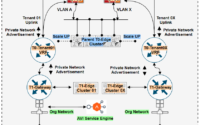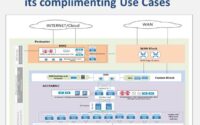Software Defined & Traditional Network

Why SDN?
Before comparing software-defined & traditional Network – let’s understand what is causing the change. The trigger for SDN is the by-product of high demand for smart and mobile devices and the growth in virtualization and cloud platforms.
if you analyze closely these new trends have significantly changed the traffic patterns within a data center. In contrast to the client-server model, applications are today rely on multiple databases and servers. Resulting in significant machine-to-machine traffic before providing data to end user. Furthermore, there is an added complexity of anywhere, anytime and any device data access. Thanks to the ‘consumerization of IT’ trend, also have resulted in the emergence of a utility computing model. It comprising of various cloud offerings such as private cloud, public cloud, or a hybrid. Causing more traffic within and between data centers.
SDN vs Traditional Network
With private and public clouds fast becoming an integral part of the enterprise IT infrastructure, the need for increased security, compliance, and auditing requirements increases. I believe comparing software-defined & Traditional network offering would help you to identify some of its key capabilities & features. Which in turn could help you with making a better decision.

Summary
As you may identify from the above comparison – SDN is a key disruption in the network technology industry. It is better to consider comparing software defined & traditional network when you have a network refresh/greenfield opportunity. The exercise should be done with respect to your environment and see the SDN use cases which are fits for you. There are many customers planning to build SDN network or SDN ready network and most of them are afraid of the process. The major concern I hear is about the learning curve it causes in their organization – however, with correct migration strategy it is very possible to move to SDN model seamlessly
I hope this blog helps you to make a better futuristic decision. Please feel free to reach out to us if you need any help with this matter. For further reading, please visit the blog “value proposition of SD-WAN” and “Active-active data center“. Happy learning.



I agree with this post completely. Data traffic trends have changed greatly in the past decade. I like the way you have compared the different aspects of traditional network and SDN. The need to save a few extra bucks is provoking people to give up the traditional way. Keep sharing such informative posts.
Thanks Nelson